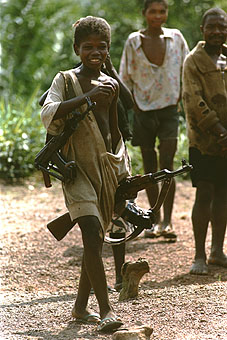Meeting in Harare, Zimbabwe in 1998, the Eighth Assembly of the World Council of Churches adopted a statement on child soldiers, stating: “The involvement of children in armed conflicts violates fundamental humanitarian principles, exposes them to the risk of death and injury, threatens their physical, mental, emotional and spiritual well-being, and draws them into a culture of violence.”
The use of children as soldiers destroys lives, families and the social fabric of communities. Conditions of violence and poverty are perpetuated when children are forced to abandon school and their families to enter conflicts. The practice violates international law, which has established the minimum age of 18 for recruitment into all forms of military service. Action must be taken to ensure that this standard is universally upheld, violators are brought to justice and hope is restored for children trapped in this cycle of violence.

Child
soldier, Liberia (1997)
“Children
are our future. To accept the use of child soldiers in conflict is to
accept the destruction of our future, one child at a time.”
Kofi Annan, UN Special Session on Children, May
2002
The term ‘child soldiers’ applies to male and female children under the age of 18 – but as young as 7 – who act as frontline combatants, porters, spies, messengers, guards, servants and sexual slaves for government armed forces or armed rebel groups. There are currently an estimated 300,000 children engaged as soldiers in 30 countries worldwide. Some 120,000 children are fighting in Africa alone, with similar numbers in Asia and South America.
Armed groups and some governments perceive children to be ‘cheap’ and ‘expendable’ recruits who can be indoctrinated to commit atrocities, or even suicidal actions. A shortage of adults in protracted conflicts makes children vulnerable to recruitment. The proliferation of small arms, which can easily be handled by children, contributes to the problem. Children are frequently abducted from schools or refugee camps by armed groups, or coerced with promises of food or money. Some join to escape relentless poverty and social discrimination.
Child soldiers encounter the extreme violence of modern war and the risk of injury, death, malnourishment, and manipulation with drugs or alcohol. Girls are particularly vulnerable to sexual exploitation, including infection with HIV/AIDS. Exposure to horrific violence, compounded by separation from family and social structures, has long-term consequences including addiction, psychological trauma and physical disability.
Those child soldiers fortunate to survive a conflict or escape face a long road of re-integration into normal community life. Many are desensitized to violence and have difficulty adapting to life without a weapon. They often face resentment from family and friends because of acts they have been forced to commit. Rehabilitating former child soldiers and assisting them to live as productive citizens is a difficult process.
“Children are not expendable
- they belong in schools and in their families. This is their right. It
is our responsibility to ensure that they are protected from the horrors
of warfare.”
Carol Bellamy,
UNICEF Executive Director, February 2002
The international response
The international community has responded to pressure and undertaken to ban the use of child soldiers. In 1996 the United Nations released a report, “The Impact of Armed Conflict on Children”, which provided a plan of action to protect children in situations of armed conflict. In response, the UN Secretary General appointed Olara Otunnu of Uganda as his Special Representative for Children in Armed Conflict.
Since 1998 the use of child soldiers has
been banned in international humanitarian, criminal and labour law. The
Rome Statute of the International Criminal Court and the Worst Forms of
Child Labour Convention of the International Labour Organization both
address the issue of child soldiers. On 25 May 2000, the United Nations
General Assembly adopted the Optional Protocol to the Convention on the
Rights of the Child. With its entry into force on 12 February 2002, states
parties committed to uphold a minimum age of 18 for all forms of military
recruitment. Non-governmental organizations, including member churches
of the WCC, formed the Coalition to Stop the Use of Child Soldiers to
lobby for the Optional Protocol.
The response of the WCC
The Eighth Assembly of the World Council of Churches condemned any use
of children in warfare, calling member churches to work to prevent the
recruitment and deployment of children as soldiers, and to assist the
rehabilitation and re-integration of former child combatants. This is
one expression of the churches’ fundamental responsibility to act
as guardians and advocates for children.
He took a little child and had him stand among
them. Taking him in his arms he said to them, “Whoever welcomes
one of these little children in my name welcomes me…
Mark 9:36-37
In communities plagued by conflict, churches play a unique role in ministering to the physical, emotional and spiritual needs of the people. They provide sanctuary for former child soldiers, and aid in their rehabilitation with physical and spiritual support. Globally, churches can help raise awareness about the plight of child soldiers.
Speaking
as the moral voice of society, churches must continue to challenge the
culture of violence that permits the ongoing recruitment of children into
armed forces. All governments must be called to sign, ratify and implement
the Option Protocol – to date only 110 countries have signed and
27 have ratified. Of these states, Canada, New Zealand and the UK have
declared their intent to permit voluntary enlistment at the age of 17.
Non-state actors are not party to the treaty, but must be held accountable
to this standard. In the context of the Decade to Overcome Violence: Churches
Seeking Reconciliation and Peace (2001-2010), churches should join together
in calling governments to end the morally repugnant practice of child
recruitment.
Practical Ways to Get Involved:
“Forcing
children to fight adult wars is an act of cruelty that should be regarded
as unacceptable to all civilized societies.”
Olara Otunnu, Special Representative
of the Secretary General on Children and Armed Conflict, November 2001

“Campaiging for the abolition of child soldiers” is one aspect of the
Peace to the City Seven-Point Peace Plan
JOIN
THE PEACE TO THE CITY NETWORK!
Let us know who you are and what you are doing! Let the World Council
of Churches know about the work you are doing so we can let others know
and join you. Let us know how our programme can help with information
and link you up with others who have the expertise.
Back
to main Peacebuilding and Disarmament page
Back to the WCC and Microdisarmament page